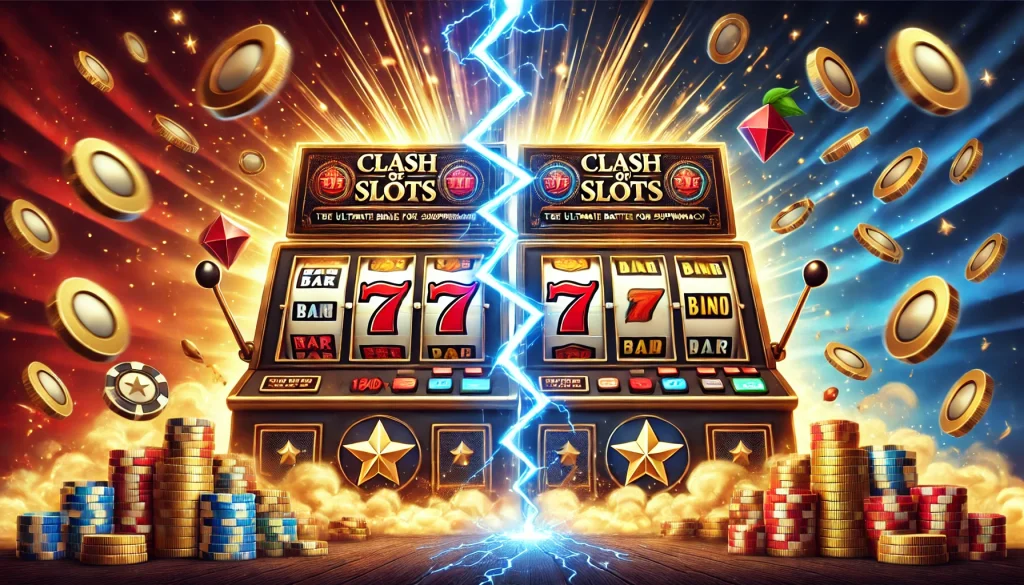
Clash of Slots: A Comprehensive Analysis Over the past few decades, the gambling industry has experienced a dramatic change, with slot machines becoming one of the most accessible entertainment options in both physical casinos and online venues. The phrase “Clash of Slots” captures the competitive spirit of this type of gaming, in which casinos and developers fight for players’ interest & allegiance. Examining the development of slot games, the emergence of online casinos, & the technological breakthroughs that have influenced their growth, this article explores the complex world of slot games. As we make our way through this complex world, we’ll also look at player engagement tactics and the direction that slot games are taking, finally exposing what makes them a gambler’s favorite. Slot machines began as simple mechanical devices in the late 19th century and have since developed into intricate digital experiences.
Players have been enthralled with the attraction of spinning reels and the excitement of possible winnings for generations. Through investigation, we will learn how these games have changed to accommodate evolving player tastes & technological developments, creating a thriving and competitive market. In addition to being a competition for money, The Clash of Slots is also a contest of player satisfaction, creativity, and innovation that continues to influence the gambling industry. The Liberty Bell, a basic mechanical device with three spinning reels and a small number of symbols, was created by Charles Fey in 1895, marking the beginning of the history of slot machines.
The groundwork for a multibillion-dollar industry was established by this revolutionary invention. Slot machines changed from being mechanical to being electromechanical in the middle of the 20th century, bringing with them features like automated payouts and increasingly intricate gameplay mechanisms. A major paradigm shift was brought about by the 1970s release of video slots, which featured improved sound effects, graphics, and interactive features that engaged players in novel ways. Slot games became more complex and appealing as technology developed.
Slot games entered the digital sphere with the emergence of online casinos in the 1990s. This change not only made games more accessible, but it also gave developers the opportunity to make games with more complex themes and plots. Slot machine games of today have cutting-edge visuals, captivating soundtracks, and creative gameplay elements like bonus rounds and cascading reels. The development of slot machines is indicative of a larger trend in the gaming sector, where entertainment value and player engagement are crucial. As a result of the internet’s revolutionary impact on the gambling industry, online casinos that allowed players to play conveniently from home or while on the go began to appear.
Online slot casinos have become very popular because they are easily accessible, offer a wide selection, and frequently have better odds than traditional brick-and-mortar casinos. Thousands of distinct slot games with distinct themes, features, & payout patterns are currently available to players. With so many options, there is something for every player, regardless of their preferences. Online casinos have also used technology to further improve the player experience. Features like mobile compatibility, live dealer games, and interactive components have completely changed how players interact with slot machines. Online slots are now more popular than ever because they can be played on a variety of devices, including desktops, tablets, and smartphones.
Many online casinos also provide alluring bonuses and promotions to draw in new players & keep hold of current ones. Because developers are working to produce engaging experiences that stand out in a crowded market, the industry’s innovation has been spurred by this competitive environment. Player engagement has emerged as a key priority for developers and online casinos alike in a market marked by intense competition. Keeping players interested is crucial for success because they have access to an infinite number of options.
Developers of video games are always coming up with new ways to make immersive gameplay and compelling stories that entice players to return for more. To improve player interaction and create a feeling of community, many slot games have incorporated gamification features like leaderboards, achievements, and loyalty programs. Understanding player psychology is also essential for creating captivating slot machine experiences.
By examining player behavior, developers can spot patterns and preferences & adjust their products accordingly. For example, a lot of contemporary slot games have social features that let users compete with friends or share their accomplishments. In addition to increasing player engagement, this social component gives them a feeling of community. To make sure that their games connect with players, developers must carefully balance familiarity and innovation as the competition for player engagement heats up. The development of slot games has been propelled by technology, which has an impact on everything from player experience to game design.
Through the provision of unpredictable results for every spin, the incorporation of Random Number Generators (RNGs) guarantees fair play. Both physical and virtual casinos now use this technology as standard, giving patrons peace of mind about the reliability of their gaming experience. Also, the development of visually stunning games that immerse players in worlds with captivating themes has been made possible by advancements in sound and graphics technology. Also, new technologies like augmented reality (AR) and virtual reality (VR) are starting to have an impact on the slot machine industry. These technologies offer a previously unheard-of level of immersion, which has the potential to completely transform how players engage with games.
Envision entering a virtual casino where you can engage with slot machines in person or explore themed settings that improve gameplay. These technologies have the potential to completely transform player engagement and produce brand-new gaming experiences that conflate virtuality & reality as they advance. Recognizing the percentage of return to player (RTP). Understanding a game’s Return to Player (RTP) percentage is one basic strategy. RTP is a measure of how much money a game gives players over time; selecting slots with higher RTP percentages can enhance results over the long run. The management of bankrolls & volatility.
Players should also become acquainted with the volatility of various slots; low volatility slots tend to yield smaller wins more frequently, while high volatility slots may offer larger payouts but less frequently. Another essential tactic for winning at slots is managing your bankroll. To prevent overspending, players should establish & adhere to spending limits.
Making use of bonuses & promotions. Making use of the bonuses and promotions that online casinos provide can also improve gameplay without having to risk more money. Players can prolong their playtime & raise their chances of striking a winning combination by utilizing deposit matches or free spins. The future of slots seems bright & full of opportunities as we look to the future.
It is probable that the continuous incorporation of cutting-edge technologies will continue to significantly alter the terrain. Artificial intelligence (AI), for example, is anticipated to become more significant in tailoring player experiences through the analysis of preferences & behavior patterns. This might result in personalized bonuses or game recommendations that speak to specific players, increasing their level of satisfaction and engagement. Also, we might observe new chances for industry innovation as global regulatory frameworks change. The emergence of blockchain technology and cryptocurrencies may bring new forms of payment & increase transaction transparency. Also, developers will probably concentrate on producing mobile-first experiences that are tailored to players who are constantly on the go as long as mobile gaming continues to rule the market.
Inspiring advancements that will maintain player interest and push the limits of slot game creativity are anticipated in the future. To sum up, the Clash of Slots is an example of how innovation, player involvement, and technological development interact dynamically in the gambling sector. Slot games have changed over time to accommodate shifting player tastes and expectations, starting as simple mechanical devices & continuing as digital powerhouses today. This landscape has been further altered by the emergence of online casinos, which provide unmatched accessibility & variety while encouraging developer competition.
It is evident that the players themselves will ultimately prevail in this conflict, not just the developers or casinos, as we enter a new era characterized by quick technical breakthroughs and changing player dynamics. With a growing number of options available to them, players can explore new ways to interact with their favorite games and enjoy immersive experiences catered to their preferences. The Clash of Slots is sure to keep audiences interested for years to come as we embrace this exciting future for slot gaming.


